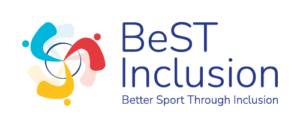
The European online roundtables.
As one participant of the Disability roundtable said: « It’s about willingness, openness to look for solutions rather than focusing on problems. » BeST Inclusion project really wants to provide more solutions for a more inclusive and diverse workforce in the European sport sector. Like, the general purpose of this project is to produce concrete recommendation and good practice, in order to get greater inclusiveness in the sport sector.
As part of BeST Inclusion project, 3 European online roundtables were organized. The meaning of the roundtables was to identify the employment barriers that young people, people with disabilities and women may encounter in the European sport sector. Each roundtable addressed a specific topic: disability, age, and gender.
The first European roundtable was organized by the Finnish paralympic committee on the 27th of October. This session gathered 16 participants from different countries: Germany, Finland, France, Belgium, Spain, US, Portugal, Ireland, and Lithuania
It was the occasion to exchange about what is keeping people with disabilities from employment in the European sport sector. After a general presentation led by the Finnish paralympic committee and UNESCO chair Munster technological university, the participants were split into two small groups, as a way to facilitate the discussion. They exchanged and gave their points of view on some interrogations:
- What are the barriers that keep people with disabilities from employment in the sport sector?
- Is the sport sector welcoming people with disabilities as employees?
- Is there a lack of solution/information to enable people with disabilities to work in the sport sector?
It was a great time, as the Finnish paralympic committee managed to gather relevant and interesting participants. From this session all the participants agreed that the lack of education, role models and awareness were significant factors for the employment of people with disabilities in the European sport sector.
Find out more about it in this report: Disability European online roundtable
Then the second European roundtable was organized by ENGSO Youth (European Non-Governmental Sport Organisation) on the 8th of November. This session gathered 14 participants from different European countries: France, Leetonia, Italy, Denmark, Belgium, Spain, Malta, UK, Netherlands
It was the opportunity to talk about the employment barriers that young people may experience in the European sport sector. After the presentation of key figures presented by the University of Cassino southern Lazio, the participants were split into two small rooms, in order to discuss about some issues:
- Age discrimination and bias in the labour market: what is the solution in the sport sector?
- Do we need specific strategies in Europe to enhance work attractiveness to all sport employees no matter their age?
- Is the EU promoting an age-inclusive workforce?
Due to ENGSO Youth, this roundtable highlighted that young people have a place in the European sport sector and should get a bigger one in the governance of the sports institutions. Young people are really involved in the sport sector, especially as volunteer, this sector just need to look like a welcoming and rewarding career path from them.
Find out more about it in this report: Age European online roundtable report
The last European online roundtable was organized by Alice Millat Association on the 23rd of November. This session gathered 19 participants from different countries: Italy, Belgium, Spain, Netherlands, Finland, Sweden, and France.
It was the occasion to talk about the employment barriers that women may experience in the European sport sector. After the presentation of key figures by the University of Murcia, the participants were split into small rooms, as a way to discuss and debate about some topics:
- Women in the sport labour market: which place, which positions?
- Do women have access to training/education to work in the field of sport?
- What are the consequences of the low presence of women in the sports professions?
- What are the barriers to women’s access to employment in the sports labour market? What kind of barriers are they?
In this session, all the participants agreed that in the sport sector the difference of treatment between men and women is mostly from cultural stereotypes. Women are still lacking from a fair treatment and are still struggling to reach the highest position. While it was proved, that companies with a better gender diversity are more profitable.
Find out more about it in this report: Gender European online roundtable report
The meaning of those roundtables was to highlight the barriers that prevent to get a more inclusive workforce. BeST Inclusion chooses to address those topics. All the exchanges will contribute to the studies that our academic partners will produce. Each academic partner will have to produce a study on the employment barriers. Those studies will be delivered for mid/end 2023.
Once again thank you to all the participants of the European online roundtables!
